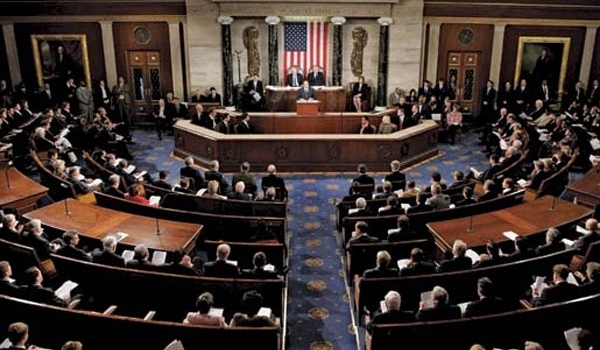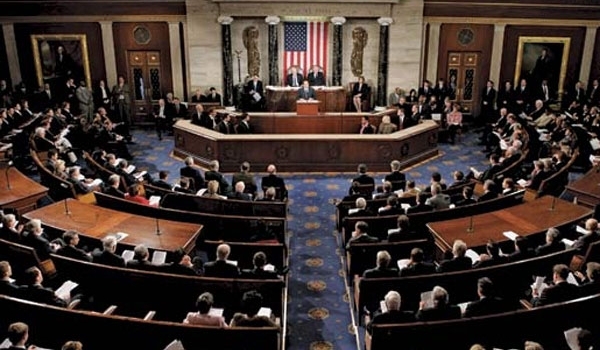US Senators Show Hostility against Iran amid Talks

Several Democrat senators in a letter asked US President Barack Obama to take a tougher position on Iran despite the progress made in the nuclear talks between Tehran and the Group 5+1 (the US, Russia, China, Britain and France plus Germany).
The Saturday letter from 22 Democrat senators and one independent appreciated Obama’s double-track (sanctions and negotiations) approach on Iran, and called for tougher procedures of transparency and verification to allegedly guarantee non-diversion in Iran’s nuclear energy program.
The letter was issued from the office of Senator Carl Levin.
The Iranian officials have censured the United States’ antagonistic moves in the talks between Iran and the world powers.
“It seems that the US is now aware that it has nothing to say in the nuclear negotiations and it should accept that their resolutions have no legitimacy, therefore, it has told its elements to create a new atmosphere and divert the negotiations from its path in a dusty atmosphere,” Iranian Parliament Speaker Ali Larijani said, addressing an open session of the parliament in Tehran earlier this month.
“The US and UN officials should know that they are responsible for rocking the boat in negotiations and they can never again say that this has been Iran which has left the negotiations table,” he added.
On November 24, Iran and the five permanent United Nations Security Council members sealed a six-month Joint Plan of Action to lay the groundwork for the full resolution of the West’s decade-old dispute with Iran over the latter’s nuclear energy program.
In exchange for Tehran’s confidence-building bid to limit certain aspects of its nuclear activities, the Sextet of the world powers agreed to lift some of the existing sanctions against Tehran and impose no nuclear-related sanctions on Iran during the six-month period.
Last week work continued by Iran and the Group 5+1 (the US, Russia, China, Britain and France plus Germany) for striking a final and comprehensive deal, and representatives of the seven nations had several sessions of talks in Vienna on Tuesday and Wednesday.
After the negotiators of Iran and the sextet wrapped up their meetings on Wednesday, Iranian Foreign Minister Mohammad Javad Zarif underlined that Iran and the six world powers have still a difficult way ahead before striking a comprehensive deal over the former’s nuclear activities, but meantime said today’s talks showed promising signs.
“On four topics (Arak heavy water reactor, removal of sanctions, nuclear cooperation and uranium enrichment) we see signs of reaching an understanding which will protect the rights of the Iranian nation and move towards removal of problems,” Zarif told reporters after a meeting with EU foreign policy chief Catherine Ashton following two days of talks between Iranian negotiators and their counterparts from the Group 5+1 (the five permanent UN Security Council members plus Germany).
He assured that in case of good will and political resolve, Iran and the sextet can attain a final, comprehensive agreement and then work on its implementation to end their decade-long nuclear standoff.
Responding to FNA’s question about the issues to be covered in the upcoming talks between the senior negotiators of the seven nations in Vienna on April 7-9, the Iranian foreign minister said that “Iran’s access to (nuclear) technology, trade market and banking resources as well as the manner of inspections (of Iran’s nuclear facilities) and the period of time needed for the final phase will be discussed in the next meeting.”
Zarif said “the main goal is normalizing Iran’s case similar to every other member state of the NPT” (nuclear non-proliferation treaty).
He said during the recent talks, the six world powers have grasped a better understanding of Iran’s objectives for developing nuclear technology and now seemed to be convinced of Iran’s civilian drive.
Asked about the operation of Arak heavy water reactor which has been the focus of a part of the recent talks between Iran and the six world powers, he said the powers have now realized that Iran would never accept dismantlement or closure of any of its nuclear facilities and activities, “and I think the opposite party has realized this reality and will cope with it”.
EU Foreign Policy Chief Catherine Ashton also hailed the two days of talks with Iran as “positive and constructive”.
Ashton said the multifaceted talks focused on Iran’s enrichment program, the heavy water reactor in the Central city of Arak, civil nuclear cooperation with Iran and the western sanctions against Tehran.
She said that Iran and the Group 5+1 will try to address major issues in their negotiations, and announced that the two sides’ experts will meet in the near future.
According to Zarif, experts of the seven nations will convene in Vienna on April 3 to 5 and then the top negotiators of Iran and the world powers will meet for another round of talks on April 7 to 9.








